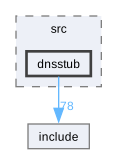 |
fehQlibs 27
Qlibs
|
 |
fehQlibs 27
Qlibs
|

Files | |
| dns_cname.c | |
| DNS cname lookup. | |
| dns_dfd.c | |
| domain name qualification (domain from dot) | |
| dns_domain.c | |
| domain qualification | |
| dns_dtda.c | |
| domain to dot append | |
| dns_ip.c | |
| DNS IP query. | |
| dns_ipq.c | |
| DNS hostname qualification for ipv4 and ipv6. | |
| dns_mx.c | |
| dns MX query | |
| dns_name.c | |
| DNS name query (ptr) | |
| dns_nd.c | |
| DNS domain name for ip (wire format) | |
| dns_packet.c | |
| DNS low level packet routine. | |
| dns_random.c | |
| random use of DNS resolvers given their IP | |
| dns_rcip.c | |
| DNS receive for query. | |
| dns_rcrw.c | |
| DNS receive rewrite. | |
| dns_resolve.c | |
| high-level DNS resolve function | |
| dns_sortip.c | |
| random sort of DNS servers per IP | |
| dns_transmit.c | |
| DNS query function. | |
| dns_txt.c | |
| DNS text query (txt) | |
Simple DJBDNS stub-resolver based on 'djbdns-1.05(IPv6)' allowing for each calling application individually to include up to 16 DNSCACHEIP(s) as DNS forwarding/resolving servers to be tried sequentially.
Here,
In any case, compactified IPv6 addresses are understood. IPv4/IPv6 addresses in brackets are understood by dns_ip.
If $DNSCACHEIP is not provided as environment variable, the stub-resolver will use the system-wide
If provided, the stub-resolver uses either a system-wide configuration file
Well-known domain names 'localhost', 'ip4-loopback' and 'ip6-loopback' are handled locally, thus no DNS query is used (RFC 6761). 'localhost' is advertised as '::1' and '::ff:127.0.0.1' in it's native IPv6 format. It is up to the caller to convert the IPv6-mapped IPv4 address to the IPv4 format.
Local domain names can be alternatively specified (per application) using the environment variable
See: https://cr.yp.to/djbdns/qualify.html
For return codes < 0, the following conventions have been applied:
include/dnsresolv.h
#define DNS_NXD 0 #define DNS_MEM -1 #define DNS_ERR -2 /* parsing errors and others */ #define DNS_COM -3 /* (socket) communication errors */ #define DNS_INT -4 /* internal errors */ #define DNS_SOFT -5 /* either -2 or -3 */ #define DNS_HARD -6 /* CNAME loop problem */
The modification of the return code is typically not problematic, since mostly just rc = -1 is checked.
In the future, these return codes are subject of change. Thus, instead of
if (dns_XX(...) == -1)
one shoud use the more general syntax
if (dns_XX(...) < 0)
to check for 'negative' results, allowing further actions and refinements given the calling sequence.
$DNSCACHEPIP The upstream resolver's IP[v4|v6] addresses (up to 32). IPv6 LLU addresses may be suffixed with the interface name. $DNSREWRITEFILE Alternate location for the system-wide /etc/dnsrewrite file $LOCALDOMAIN Additional local domain name appended to unqualified hostnames dynamically.
Sample for the file /etc/dnsrewrite:
#annything.local -> me -.example.com:me # me -> 127.0.0.1 =me:127.0.0.1 # any.name.a -> any.name.af.mil *.a:.af.mil # any-name-without-dots -> any-name-without-dots.heaven.af.mil ?:.heaven.af.mil # remove trailing dot *.:
and DJB's explanations are given here:
Instructions are followed in order, each at most once. There are four types of instructions:
=post:new means that the host name post is replaced by new. *post:new means that any name of the form prepost is replaced by prenew. ?post:new means that any name of the form prepost, where pre does not contain dots or brackets, is replaced by prenew. -post:new means that any name of the form prepost is replaced by new.
Erwin Hoffmann, June 2023.